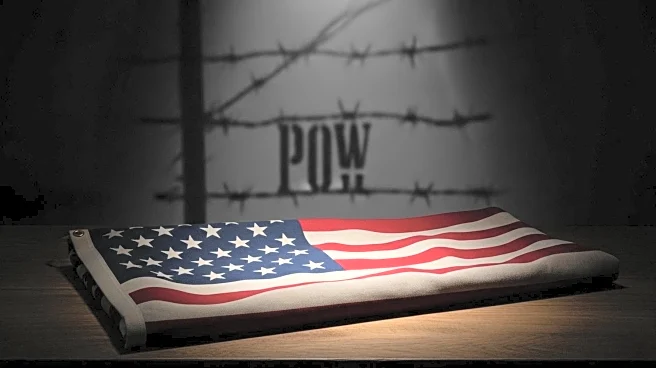What's Happening?
Alfonso Antonio Garizio, a World War II veteran, spent three years as a prisoner of war in East Asia, enduring harsh conditions while working on the Burma-Thailand railway and in Japanese copper mines. His daughter, Gillian Powell, recently laid a wreath on his behalf at Colchester Castle to commemorate the 80th anniversary of VJ Day. Garizio, who was captured after the fall of Singapore in 1942, survived the Hell Fire Pass section of the railway, which claimed the lives of 90% of the POWs forced to build it. Despite the physical hardships, including severe malnutrition, the psychological effects of his captivity persisted long after the war ended. His family noted that he rarely spoke of his experiences, as returning soldiers were often advised to keep silent about their ordeals.
Why It's Important?
The story of Alfonso Garizio highlights the enduring impact of wartime experiences on veterans and their families. It underscores the psychological trauma that can persist long after physical wounds have healed, affecting personal and familial relationships. This narrative serves as a reminder of the sacrifices made by soldiers and the importance of acknowledging and addressing the mental health challenges faced by veterans. The family's commemoration efforts on VJ Day also emphasize the need to honor and remember those who served, particularly those who were part of the 'forgotten army' in the Pacific theater.
What's Next?
As the family continues to honor Garizio's legacy, there may be increased efforts to raise awareness about the experiences of POWs and the psychological toll of war. This could lead to more support for veterans' mental health services and initiatives aimed at preserving the history and stories of those who served in less publicized roles during the war. Additionally, commemorative events like VJ Day may inspire broader public recognition and educational efforts regarding the Pacific theater's historical significance.
Beyond the Headlines
The story of Alfonso Garizio also touches on the cultural and ethical dimensions of post-war reconciliation. His family's avoidance of Japanese products until necessity dictated otherwise reflects the complex emotions and lasting impact of wartime experiences on personal and cultural attitudes. This narrative invites reflection on how societies can heal and reconcile after conflict, balancing remembrance with the need to move forward.










